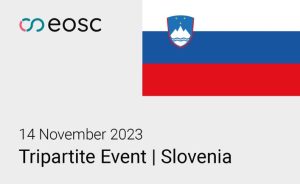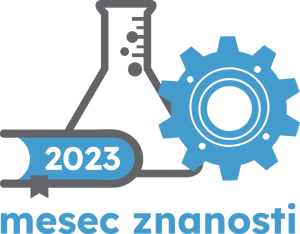Following the internationally acclaimed success of the previous “Open Science Day”, this year’s conference will take an even deeper look at the challenges of open science. With the recent adoption of new sectoral legislation (Scientific Research and Innovation Activities Act, 2021) and this year’s adoption of the Decree on the implementation of scientific research work in accordance with the principles of open science (2023) and the Open Science Action Plan (2023) following the Resolution on the Slovenian Scientific Research and Innovation Strategy 2030 (2022), the Slovenian research landscape is increasingly aligning with the expected image of a common European Research Area (ERA).

This year’s national EOSC tripartite event will focus on the future of EOSC, changes in the research assessment and copyright in the light of open science. Special attention will be given to solutions in the area of national infrastructures for open science. The two-day event will feature a rich programme, including best practice examples of EOSC and open science, and the first national citizen science event.
Open Science Day2 2023 will once again bring together key players in the field of open science and innovation at the European and national level, scientists, researchers and service providers. Together and in dialogue, we will shape the Slovenian research landscape as it is tailored by the scientific research community. The conference will also include the announcement of a nationwide hackathon aimed at bringing together two intertwined fields: open science and supercomputing.
Open Science Day2 2023, the national tripartite EOSC event, will take place on 14 and 15 November at the Four Points by Sheraton Ljubljana (hotel Mons).
Registration is required for the event, which is organised as part of the annual Arnes conference “Mreža znanja” (Web of Knowledge).
More information will follow in the coming days. A preliminary version of the programme is published below.
Live video streaming:
- National EOSC Tripartite Event (14.11.);
- Working with Open Data and EOSC Success Stories (15 November);
- Citizen Science (15.11.)


|
Tuesday, 14 November 2023 |
|||||
|
9.00–9.30 |
Registration |
||||
|
9.30–9.50 |
Welcome speeches: Introduction to the EOSC tripartite event | ||||
| Dr. Igor Papič (Ministry of Higher Education, Science and Innovation, Minister)
Dr. Aleš Bošnjak (Institute of Information Sciences – IZUM, Director) Mag. Marko Bonač (Academic and Research Network of Slovenia – ARNES, Director) |
|||||
|
9.50–10.15 |
Javier Lopez Albacete (European Commission, Directorate-General for Research and Innovation, Open Science and Research Infrastructures) | ||||
|
10.15–10.40 |
Karel Luyben (European Open Science Cloud Association (EOSC A)) | ||||
|
10.40–11.00 |
Mag. Dunja Legat (University Library of Maribor, Director): Plans of the Slovenian Open Science Community | ||||
|
11.00–11.30 |
Coffee break |
||||
|
11.30–13.30 |
Changes in the evaluation of science | ||||
|
11.30–13.30 |
Roundtable: Changes in the evaluation of science in the light of open science and the European Open Science Cloud (EOSC) | ||||
| Dr. Špela Stres (Public Agency for Scientific Research and Innovation of the Republic of Slovenia – ARIS, acting)
Dr. Tomaž Boh (Directorate for Science and Innovation, acting) Prof. Dr. Boštjan Zalar (Jožef Stefan Institute, Director) Prof. dr. Boštjan Markoli (University of Ljubljana, Vice-Rector for Internationalisation and Quality) Prof. dr. Dean Korošak (University of Maribor, Vice-Rector for Scientific Research) Doc. dr. Sebastian Dahle (Young Academy, EURODOC, President) Mag. Miro Pušnik – Moderator (Central Technical Library of the University of Ljubljana – CTK, Director) |
|||||
|
13.30–14.30 |
Lunch break |
||||
|
14.30–15-00 |
Dr. Maja Bogataj Jančič (Intellectual Property Institute, Head): Copyright and the Open Data Framework for Open Science | ||||
|
15.00–17.00 |
National Infrastructure for Open Science | ||||
|
15.00–15.30 |
Mihael Dimec in Marko Drobnjak (ARNES): Arnes Open Science Infrastructure | ||||
|
15.30–16.45 |
Round table: e-Infrastructure, digitalization and the principles of open science
Dr. Jana Kolar (European Strategy Forum on Research Infrastructures, Chair) Ivan Marić (University of Zagreb, University computing centre – SRCE, Director, EOSC Steering Board) Prof. Dr Zoran Ren (Management Board of the Public Agency for Scientific Research and Innovation Activities of the Republic of Slovenia – ARIS, Chair) Prof. Dr. Andrej Filipčič (Jožef Stefan Institute) mag. Irena Vipavc Brvar (Archive of Social Science Data – ADP, Head of Area) Dr. Milan Ojsteršek (University of Maribor, FERI, Laboratory for Heterogeneous Processing, Head) Dr. Matej Praprotnik (ERC grantee, Institute of Chemistry and Faculty of Mathematics and Physics, UL) Peter Sterle – Moderator (Directorate for Science and Innovation) |
||||
|
16.45–17.00 |
Coffee break |
||||
|
17.00–18.00 |
Hackathon announcement: Open data, open science and supercomputing
Marko Drobnjak (ARNES): Hackathon information Damjan Harisch (ARNES): From data to results using a supercomputer Dr. Slavko Žitnik (University of Ljubljana, FRI): Is Slovene “too small” for large language models (LLM)? Steve Fadden, Ph.D. (Google, UC Berkeley): Hacking Design and Data: The Secret to a Sustainable User Experience* |
||||
|
18.00–20.00 |
Social gathering | ||||
|
Wednesday, 15 November 2023 – Two halls and parallel sections |
|||||
|
9.00–11.00 |
EOSC success stories
Coordination: Mag. Dunja Legat (University Library of Maribor, Director) |
9.00–11.00 |
First national event – Citizen Science
Coordination: Mag. Miro Pušnik (Central Technical Library of the University of Ljubljana – CTK, Director) – morning and afternoon part |
||
|
9.00–9.30 |
Prof. dr. Matija Strlič (University of Ljubljana, Faculty of Arts, Laboratory for Heritage Science): E-RIHS: Open data for modelling heritage collections |
9.00–9.30 |
Welcome speeches:
Dr. Tomaž Boh (Directorate for Science and Innovation, acting) Mag. Miro Pušnik (Central Technical Library of the University of Ljubljana – CTK, Director) |
||
|
9.30–10.00 |
Dr. Tomaž Erjavec (Jožef Stefan Institute): Slovenian and the CLARIN.SI Research Infrastructure for Language Resources and Technologies |
9.30–10.30 |
Keynote speech by Margaret Gold (Leiden University, Laboratory for Citizen Science, Coordinator): Citizen Science and Open Science/The Four Waves of Citizen Science* | ||
|
10.00–10.30 |
Prof. dr. Dean Korošak (University of Maribor, FGPA): BRiUM and university autonomy in the digital transition |
10.30–11.00 |
Dr. Lucija Ažman Momirski, dr. Sanela Pansinger (ERA postdoctoral fellow, University of Ljubljana, FA): Integrating Citizen Science into urban planning* |
||
|
10.30–11.00 |
Mag. Irena Vipavc Brvar (Social Science Data Archive, EOSC Future): Climate-neutral and smart cities: linking data on people and their physical environment | ||||
|
11.00–11.30 |
Coffee break |
||||
|
11.30–13.30 |
Working with open data
Coordination: Mag. Irena Vipavc Brvar (Social Science Data Archive) |
11.30–11.45 |
Dr. Daniel Doerler (BOKU – University of Natural Resources and Life Sciences, Institute of Zoology): Change – the ECSA/ACSC 2024 | ||
|
11.30–12.00 |
dr. Marko Petek (National Institute of Biology): pISA-tree data management system |
11.45–12.00 |
Dr. Zarja Muršič (Citizen Science Ambassador ): Why Citizen Science matters | ||
|
12.00–12.30 |
dr. Ana Slavec (University of Primorska, FAMNIT, Innorenew): Data Stewardship and Handling of Research Data – the InnoRenew CoE Experience |
12.00–13.30 |
Citizen Science projects in Slovenia:
Dictionary of synonyms of modern Slovene University for the Third Age Electronic collection of Letters |
||
|
12.30–13.00 |
dr. Ela Šegina, dr. Jasna Šinigoj (Geological Survey of Slovenia): Big data management: centralisation of the sensor network |
|
|||
|
13.00–13.30 |
|||||
|
13.30–14.30 |
Conclusion and lunch |
Lunch |
|||
|
/ |
/ |
14.30–15.30 |
Citizen Science projects in Slovenia:
CianoSLO Prostorož Dinaricum |
||
* Presentation in English.
Programme committee:
Maja Bogataj Jančič (IPI), Maja Dolinar (Mlada akademija), Jerneja Fridl (KOsRIS), Mateja Jemec Tomazin (KOsRIS), Iza Jugovec (UM), Mojca Kotar (UL), Simon Krek (IJS), Klavdija Kutnar (RKRS), Tadej Mauhar (ARIS), Tit Neubauer (MVZI), Milan Ojsteršek (UM FERI), Maja Peharc (MVZI), Barbara Pipan (KIS), Miro Pušnik (CTK UL), Ivan Skubic (MVZI), Ana Slavec (UP, InnoRenew CoE), Peter Sterle (MVZI), Luka Šušteršič (IJS), Irena Vipavc Brvar (ADP), Gita Zadnikar (MVZI).
Organizing commitee:
Marko Drobnjak (Arnes), Damjan Harisch (Arnes), Brina Klemenčič (UM UKM), Dunja Legat (UM UKM), Urša Vodopivec (Arnes).
